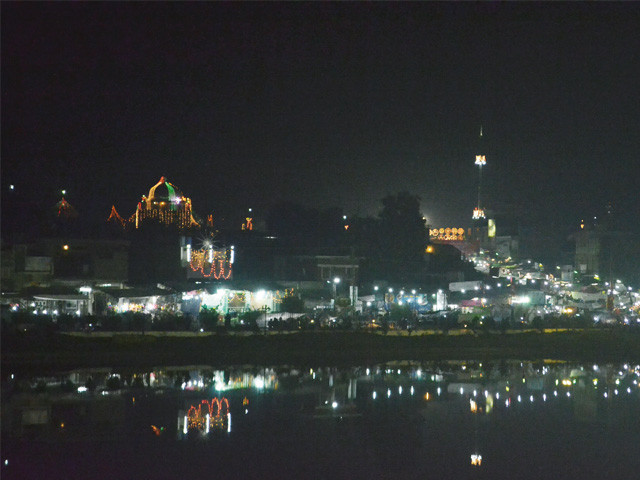Jiye Latif
Thousands descend upon Shah Abdul Bhittai's mausoleum to celebrate urs.

Jiye Latif
Thousands of pilgrims descended on Shah Abdul Latif Bhittai’s mausoleum to celebrate one of Sindh’s most revered saint’s death during the recently concluded three-day 267th urs. They pushed and shoved their way towards the tomb, chanting Jiye Latif, Naraye Hyderi and Ya Ali in a trance.
Folk artists and faqirs from across the province made the call of prayer through music. It didn’t matter which faith or sect the people belonged to. It didn’t matter where they came from or how cold the night was. It didn’t even matter whether they understood the lyrics, as like love, music knew no boundary that night.
If you are seeking god,
Then keep clear of religious
formalities.
Those who have seen god,
Are away from all religions!
The people who sat with the faqirs to talk about life were reminded of this message. The conversations held under the moonlit night concluded each time that the love for the Beloved could be the only reasonable purpose of life.
Those who love the Lord
The world cannot hold them.
Palaces do not attract them,
Nor women nor servants
Nothing binds them:
Those who renounce leave every
thing behind.
Folk artist Jamaluddin Faqir and his band of ten musicians said that people are being enchanted by their art more than ever. “When I hear about attacks on shrines it makes me extremely sad,” he said. But, he added, that “hate only made him stronger in his resolve to spread the Sufi message of love and peace through his music.”
Musicians of African descent from the Makran coast also made their presence felt. They stood in two rows facing each other at the doorstep of Latif’s tomb and swayed their bodies, Maasai-style, to the beat of their large drums, chanting ‘La Illaha Ila ho!’ (There is no God, but you!)
In another corner of the courtyard, a group of seven artists holding the Damboor sang Latif’s poetry in the Waee form.
They followed the tradition of first holding their hands together in prayer before plucking the first notes on their five-stringed instruments.
Music from instruments which one never hears was in full display at the shrine. For example, the sound of Kartal, a percussion instrument similar to the Chimta and the melancholic tunes of the violin-like Surando reverberated through the open courtyard.
A separate music show, which was attended by ministers and high-ranking officials, was held at the concert hall located at a short distance from Latif’s mazaar. Here, in sharp contrast to the scene at the shrine, visitors sat on comfortable sofas and sipped tea inside while many others were outside in the cold to catch a glimpse of their favourite artists on an LCD screen.
Even though Latif wouldn’t have approved of the evident inequality on display, the show was a massive hit among the audience.
Sanam Marvi of Coke Studio fame stole everyone’s hearts, first by her beauty and then by her extremely well controlled vocal range. Her effortless singing of high and low pitch notes would have satisfied even Latif’s soul.
Ustad Fateh Ali Khan had a jugal bandi with an exceptional instrumentalist, who played the dulcimer-like banjo. Surprisingly, the crowd appreciated Khan’s advanced and purely eastern classical rendition.
Mazhar Hussain and Zulfiqar Ali, who both teach at the music department of the Sindh University, presented Shah Latif’s Waee in Urdu translated by the eminent writer Agha Saleem. Humaira Channa was another hit as she sang the folklore about the popular Sassi-Pannu love story.
The concert which continued till early morning included acts by Amber Mahak, Bakhtawar Noor, Deeba Sehar, Barkat Ali and a duet by Samina Kanwal and Ovais Mohammad Jumman.
Published in The Express Tribune, January 24th, 2011.



















COMMENTS
Comments are moderated and generally will be posted if they are on-topic and not abusive.
For more information, please see our Comments FAQ